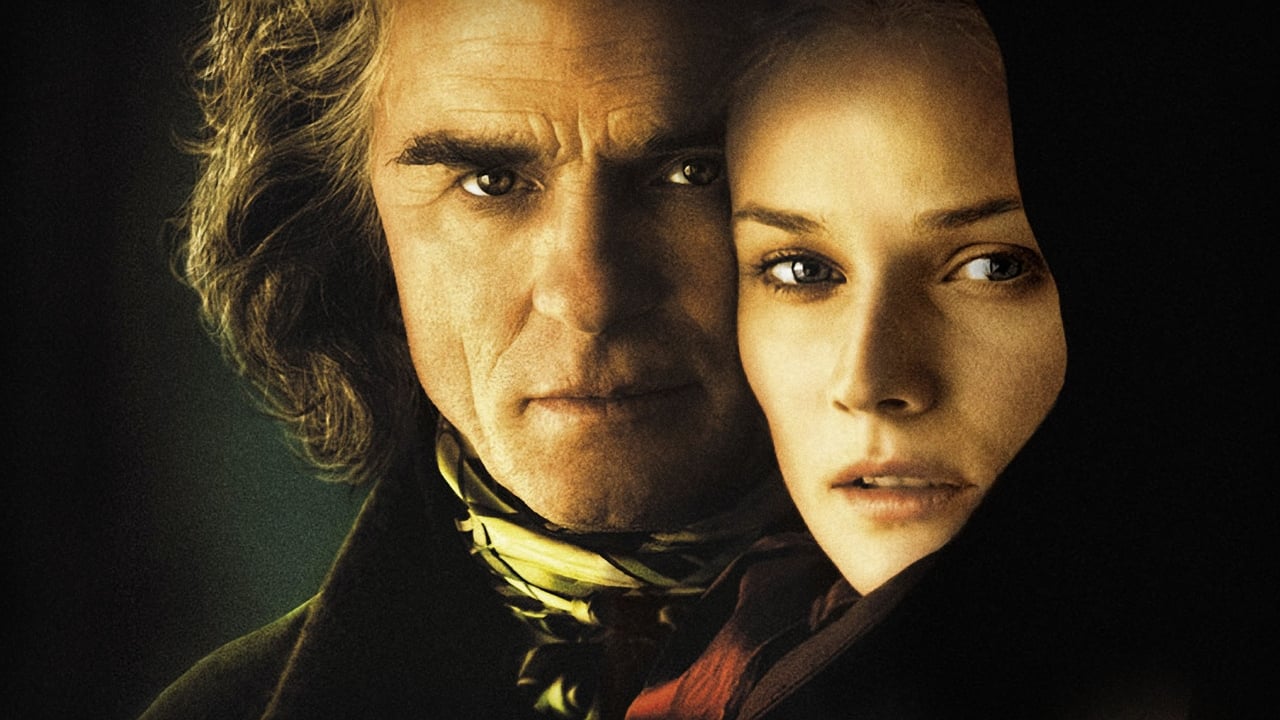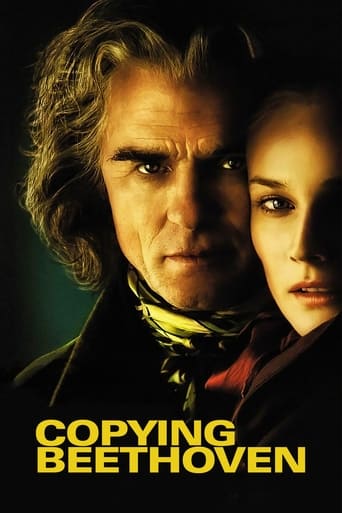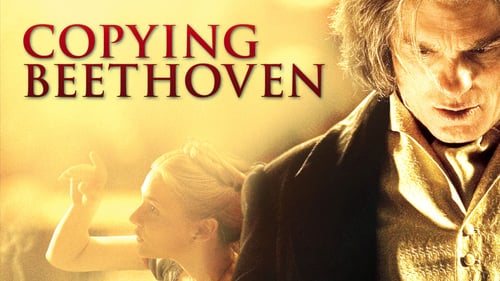



The plot isn't so bad, but the pace of storytelling is too slow which makes people bored. Certain moments are so obvious and unnecessary for the main plot. I would've fast-forwarded those moments if it was an online streaming. The ending looks like implying a sequel, not sure if this movie will get one
View MoreIt really made me laugh, but for some moments I was tearing up because I could relate so much.
View MoreOne of the best movies of the year! Incredible from the beginning to the end.
View MoreClose shines in drama with strong language, adult themes.
View MoreVery nice movie with most interest focused on the film's music track, Ed Harris is perfect, mainly due to similarity he did the best he could and of course attributed the "quality" of Beethoven's character, Of course it could not and never managed to "identified" perfectly with the myth that incarnated. ( I don't know if anyone else could do better, maybe only Ian Hart which was the best "Beethoven" ever in my opinion).Diane Krueger as Cholts, is right, with internal dynamics that took no outward, deliberately, a modest quiet strength in front of the "God of music"! Remarkable how there isn't a love scene, something I respect a lot!
View MoreHow to make a movie about Beethoven while managing to live up to the stupendous composer he was? And more particularly, as is the case here, about the making of his immortal, exhilarating, uplifting Ninth Symphony? Mission impossible? Well, judging from a series of past artistic failures on the theme, one would be tempted to say yes. For sure, a few of the roughnecks who dared enter such uncertain terrain should have thought twice before getting burned. Take Abel Gance for example and his outrageously overblown « Un grand amour de Beethoven », to say nothing of his equally ridiculous « 10th Symphony ». Feeling wary for fear of watching just another of those boring phoney biopics about a great genius is then justified. But the prejudice is soon - and happily so - to be disproved by what is given to see and to hear. As a matter of fact, as Agnieszka Holland's movie unfurls, the viewer (and listener) feels more and more involved... to the point of being downright carried away. It looks (and sounds) as if where Abel Gance failed (achieving to image Ludwig Van's fiery romantic music), Agnieszka Holland (a very underrated director), succeeds as for her in converting the try. Not that the movie is perfect (No one is obliged to do the impossible!). There ARE one or two debatable points. The main criticism addressed to « Copying Beethoven » concerns the script. Many are those who blame the writers (Stephen J. Rivele and Christopher Wilkinson) for taking liberties with the facts. And it is true that although building on a historically accurate situation (in 1824, after the death of his favorite copyist Schlemmer, Beethoven, who had encountered problems with his new collaborator Peter Gänzler, asked his publisher for a new one), the two authors soon take a side road. In real life, the composer was assigned two male copyists whereas in the film, there is only one - and a female one to top it all! A well-founded objection if one sticks to hardcore historical truth. But art wants what art wants: poetic licence has always existed and is acceptable insofar as the spirit of the material is respected, which is the case here, at least in my opinion. It is worth noticing by the way that the film would not have existed but for this transgression - imposed by the producers. Moreover, if - as advocated by Coleridge - you use suspension of disbelief, you will be amply rewarded. First owing to the fact that the character of Anna Holtz is well-drawn and engaging (the young woman is a true lover of music and never plays the seduction card). Also because Diane Kruger embodies her with talent, always finding the right tone, whether it be respect, fear, admiration, determination or revolt. And, what matters most, she constantly exudes a sense of dignity. All in all, the strong presence of Anna Holtz as performed by the radiant Diane Kruger gives the film a more modern (and hence universal) dimension to the film than if it had been scrupulously historically correct. The second blame often put on 'Copying Beethoven' is its way of representing Beetoven's deafness. The question is relevant: a correct representation of a deaf person on a screen does pose problems. Before making a movie featuring someone either deaf or hard of hearing, the authors indeed have a choice to make, either putting themselves (and us for that matter) in the place of the deaf character(s) or cheat a little and pretend that a spoken exchange, necessary to keep the action moving, is possible. Anyway, whatever their option, what they will show us will not be conform to reality. And whatever they choose, they will be criticized for it. In the present case, he scriptwriters opted for the second solution and my position about that will echo the one I expressed above about historical faithfulness: let's accept this convention and let's enjoy the film without playing those who know best. Beethoven managed to exchange views with Anna Holtz... All right, why not ? After all, actors do not REALLY die on the set no more than an actress actually delivers a baby! A film is NEVER a record of reality, it is always A READING OF REALITY. Whether it is a good or a bad reading is the question, not whether things happened exactly the way they are shown or not. This premise admitted, the spectator can then take advantage the rich exchanges about art, music, creation, solitude, womanhood... between the master and his not-so-obedient pupil. And admire without reservations the fabulous performance delivered by an inspired, unrecognizable Ed Harris in what may be the role of a lifetime. This all-American is downright amazing: he rings more true in his embodiment of Beethoven than Ludwig himself!I will conclude by witnessing to what has been one of the most intense emotional experiences I have been through, meaning by that the highly inspired rendering of the 'Ninth Symphony'. This amazing sequence is - even if nobody ever mentions it in film histories - a genuine piece of anthology. It works exceptionally well- at full capacity - on three levels : music of course (with a perfect performance by the London Symphony Orchestra), drama (the suspense coming from whether Beethoven will be able or not to conduct his piece till the end) and editing (the various shots and camera angles being cut in exact accordance with the pulse of the music), with the effect that each separate element (music, image and story) are blended together only to carry you away out of this world to a superior continuum, a kind of nirvana where only ravished souls access. If only for this fabulous time of rapture, 'Copying Beethoven' is not to be missed. So, my recommendation is: leave your prejudices aside and let yourself go. You will not regret it. A cocktail of history, great music, excellent filmmaking, exciting dialogue, brilliant acting and storytelling, that's an offer you can't refuse !
View MoreIf you like "Amadeus" you'll like this because it's from the same mold. We watch Beethoven (Harris) and one of his pretty young acolytes (Diane Kruger) during the last years of his death, when he was still writing music almost deaf. He dies in an epiphany, smiling, after reciting the ending of his last piece to Kruger. At peace at last. It's "Tod und Verklärung" before the letter.It accords with what little I know of Beethoven's life and character. A tempestuous Romantic, he could excoriate friends and relatives savagely, then make nice after a cooling off.I suspect that the part Diane Kruger plays, Anna Holz, a student who becomes an assistant, nurse, and obsession to the ailing giant, is made up, but I don't know for sure. I like her. She's ALMOST beautiful in a Nordic way, but not quite. She was born Diane Heidkrüger in Germany and, speaking as your anthropologist, I have to say she looks German. A good actress as well.Ed Harris doesn't look too much like the portraits and death mask but he's fine in the role and lends it a mercurial bipolar quality, eyes alight, stomping around half clothed, bathing by pouring a bucket of water over his head and flooding the apartment below.The film features a lot of his music, and it's well done. The climax is his conducting the first performance of his ninth symphony. As usual, it's necessary to use only the last movement and, at that, the tenor part is dropped, but it's okay because the music itself is glorious. It can make your hair stand on end. Whether or not a viewer knows the passages he'll recognize them from movies like "Die Hard" and from toothpaste commercials.There are many similarities to "Amadeus." Instead of Solieri there is Anna Holz. "Amadeus" went out of its way to make Mozart colorful, what with that silly giggle and Tom Hulce running around farting. The writers didn't go that far with Beethoven although there is one scene in which he plays one of Anna Holz's compositions and says it sounds like somebody passing wind and goes on to accompany the piece with raspberries.I prefer "Copying Beethoven" to "Amadeus" because the showpieces in the latter are mostly from Mozart's operas and I'm not an opera fan, and because Beethoven's music is powerful and even majestic. His late string quartets, derided by the public, are still sometimes nearly overwhelming. The guy meant business. And you know his influence has pervaded the musical community when a jazz musician like Charlie Mingus can say that he loves those difficult quartets.
View MoreI went to see the movie knowing it was a fantasy, a plot written by someone not pretending to biographical. I searched to understand more about Beethoven. I've read several Biographies about this genius and his bad temper. And then this movie, takes me into his music, tells me things about his music, words can't grasp. To me this movie is a must for anyone who wants a peace of the puzzle to understand his music and the man behind the music. A more fun way to understand some things about this mysterious man. You can comment the music choice, or the story being fantasy but that doesn't diminish the fact that the movie gives you some insight in the music, the man, the composer.
View More